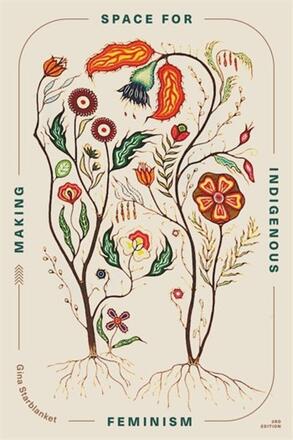
Making Space for Indigenous Feminism, 3rd Edition
Description
This book bridges generations of powerful Indigenous feminist thinking to demonstrate the movement’s cruciality for today. Indigenous feminists in the first edition fought for feminism to be considered a valid and essential intellectual and activist position. The second edition animated Indigenous feminisms through real-world applications. This third edition, curated by award-winning scholar Gina Starblanket, reflects and celebrates Indigenous feminism’s intergenerational longevity through the changing landscape of anti-colonial struggle and theory. Diverse contributors examine Indigenous feminism’s ongoing relevance to contemporary contexts and debates, including queer and Two-Spirit approaches to decolonization, gendered and sexualized violence, storytelling and narrative, land-based presence, Black and Indigenous relationalities and more. Feminism has much to offer Indigenous women, and all Indigenous Peoples, in their struggles against oppression.
Reviews
“This volume offers a view of the development and expansion of Indigenous feminisms as theory and praxis, reaffirming the validity of our respective Indigenous epistemologies to guide us into the future.”
- Jennifer Nez Denetdale (Diné), University of New Mexico
“This collection is all feast, no fluff. It covers foundational elements of Indigenous feminism with depth and breadth and engages issues of national and international importance with considerable insight. Due to its readability and smart use of theory, this book is eminently teachable. I haven’t highlighted this much in a long time.”
- Margaret Robinson, Canada Research Chair in Reconciliation, Gender, and Identity
“Multiplying are the calls for transformative healing issued by Indigenous feminism which is, at its core, about Indigenous sovereignty, solidarity, and liberatory justice for all. The diverse and incisive essays in Making Space for Indigenous Feminism (3 rd ed) expose ongoing cis-heteropatriarchal settler colonialism, anti-Indigenous racism, and the erasure of gender and sexual diversity (including by Indigenous people ourselves), and their impacts upon minds, bodies, lived experiences, and relationships. Resistance and hope abound in the re-centring of (queer) Indigenous feminist futurisms: world-building that honours the self-determination of Indigenous women, girls, Two-Spirit, and trans folks, and promotes wellbeing for all of Creation.”
- Chantal Fiola, author and associate professor, University of Manitoba
“This third edition continues to fulfill the promise of the title to make space for feminist interventions in Canadian Indigenous studies. Each author is committed to relational ethics and transformative praxis in addressing the most pressing issues that create epistemic and material injustices. From the heart rendering an intimate state-of-the-field assessment from pillars in the field, the politics of gender, policy, and violence manifested in Canada currently, to its latter chapters that open up new spaces by continuing to press for just Indigenous futures, of which decentering binaries of gender and sexuality is necessary, we see the importance of Indigenous feminist theorizing and praxis. Confronting gendered violence, heterosexism, disciplinary regimes, and colonialism with honesty and truth telling, Making Space generously offers us new paths to materialize a decolonial world.”
- Mishuana Goeman, author of Mark My Words and Settler Aesthetics: Visualizing the Spectacle of Originary Moments in The New World
“Making Space for Indigenous Feminism provides us with powerful voices emerging from and incorporating past, present, and future. Each chapter continues to make space for the power of Indigenous feminisms, as women, femme, Queer, LGBTQS+ and Mad think together in a powerful analysis of our now. This latest edition of a classic, newly edited by Gina Starblanket, includes Elders and youth and brings us back to why Indigenous feminisms are the embodied, lived, and felt knowledges that will inform our struggles going forward.”
- Dian Million, University of Washington, American Indian Studies
“Clear, hopeful, fierce, and focused, this volume teaches us why Indigenous feminisms are needed, what they make possible now and for Indigenous futures. Attending to the theories, actions, movements, and conditions of Indigenous feminisms, this book provides readers with affirmation for the kinds of projects they are already doing and what they might create to bring about the change we want to see in the world.”
- Eve Tuck, New York University